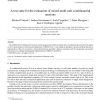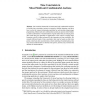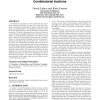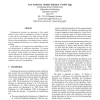140
click to vote
SODA
2012
ACM
13 years 4 months ago
2012
ACM
Motivated by the problem of querying and communicating bidders’ valuations in combinatorial auctions, we study how well different classes of set functions can be sketched. More...
159
click to vote
STOC
2012
ACM
13 years 4 months ago
2012
ACM
We consider submodular optimization problems, and provide a general way of translating oracle inapproximability results arising from the symmetry gap technique to computational co...
138
click to vote
CORR
2012
Springer
13 years 9 months ago
2012
Springer
We present a new type of monotone submodular functions: multi-peak submodular functions. Roughly speaking, given a family of sets F, we construct a monotone submodular function f ...
135
click to vote
EOR
2011
14 years 5 months ago
2011
Combinatorial auctions have been used in procurement markets with economies of scope. Preference elicitation is already a problem in single-unit combinatorial auctions, but it bec...
133
click to vote
SIGECOM
2008
ACM
15 years 2 months ago
2008
ACM
We characterize truthful mechanisms in two multi-parameter domains. The first characterization shows that every mechanism for combinatorial auctions with two subadditive bidders t...
145
click to vote
JAL
2008
15 years 2 months ago
2008
Mixed Multi-Unit Combinatorial Auctions extend and generalize all the preceding types of combinatorial auctions. In this paper, we try to make headway on the practical application...
116
click to vote
ATAL
2010
Springer
15 years 2 months ago
2010
Springer
We extend the framework of mixed multi-unit combinatorial auctions to include time constraints, present an expressive bidding language, and show how to solve the winner determinati...
154
click to vote
ATAL
2010
Springer
15 years 3 months ago
2010
Springer
Combinatorial auctions have been studied by the multiagent systems community for some time, since these auctions are an effective mechanism for resource allocation when agents are...
138
click to vote
ICMAS
2000
15 years 3 months ago
2000
Combinatorial auctions are important as they enable bidders to place bids on combinations of items; compared to other auction mechanisms, they often increase the efficiency of the...
123
click to vote
AAAI
2000
15 years 3 months ago
2000
Combinatorial auctions can be used to reach efficient resource and task allocations in multiagent systems where the items are complementary. Determining the winners is NP-complete...




